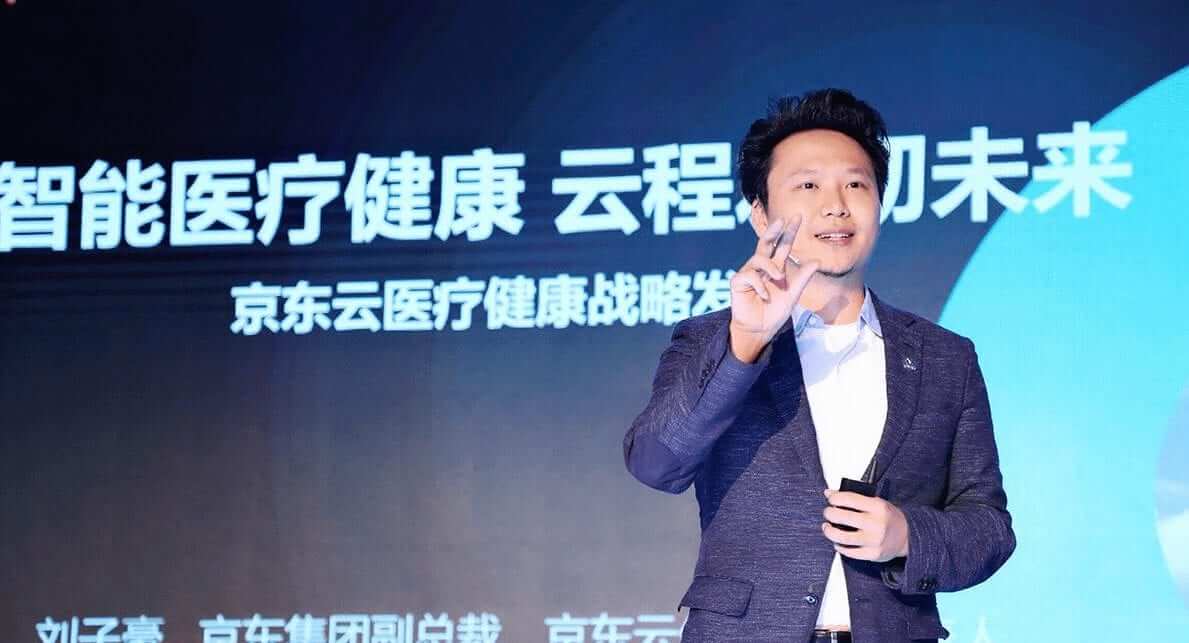Today, The Asian Entrepreneur has the pleasure of interviewing Dr. Leslie Liu who is the Corporate Vice President of JD Group, Head of JD Cloud Ecosystem. JD Cloud, an innovative and rapidly developing business division of JD.com. Of course, JD.com needs little introduction, founded in China in 1998, JD has grown to become one of the world’s largest e-commerce companies. In China alone, it is one of the largest online& offline retailers by sheer transaction volume and revenue and currently serves as one of the top competitors to Alibaba. Dr. Leslie Liu will be providing us insights into JD Cloud as well as share his thoughts on innovation and technological business development in China.
Dr. Liu, could you start off by telling us about the context of how JD Cloud fits within the overall structure of JD?
Well, JD actually became a listed company in May 2014 and JD is now actually the third largest Internet company by revenue worldwide right after Amazon. This year is the third time that JD has been listed on the global Fortune 500 list. Undoubtedly, it is fair to say that JD is growing very fast. For example, in 2017, our e-commerce platform sold products totalling 130 billion RMB. From an overall viewpoint, the JD Group business has grown 90,000 times from 2004 to 2014 and is still growing at a very fast speed pace compared to other competitors in the Chinese market.
So within this context, JD cloud is actually the technology arm for the JD group. What some might not know is that aside from e-commerce, JD is also involved in several verticals such as JD finance, JD insurance and JD logistic to name a few. The JD’s group strategy is to provide simple and cutting edge services for Chinese and global customer consumers. Especially when quality-led products and services are still a challenging topic for the Chinese market and Chinese businesses. With JD Cloud, we inherited a lot of DNA from the JD group, a lot of DNA that made us successful that will ensure we are able to be successful in developing the Chinese market.
Cloud is such a hot topic nowadays but at the same time, a lot of players have made the first move. Why does JD want to join this competitive industry and what does JD bring to the table that separates it from the competitors?
So Amazon Cloudstarted their cloud services 11 years ago. At JD, we started our cloud service in 2000 but debuted public services in 2016. In many ways, you could say, we are more like 9 to 10 years behind. How we were able to scale this very competitive market is really simple. We think we can be very successful and probably one of the largest cloud providers in the world because we believe that cloud business still in its early stages. However, we believe that for the future digital economy, cloud is the very foundation, in the same way that water and electricity being the foundations of an operating society. I would even go to say that cloud is the foundation for all the economies.
Nevertheless, today cloud is still in the early stage, it’s still new, it’s a new business model and there are still a lot of challenges that remain unresolved. There are a lot of fundamental problems that needs to be resolved and improved. A lot of aspects of the industry, with new ideas that need to be experienced and experimented, so there is definitely a chance for all competitors including JD.
In terms of JD, we might be late to the game but I would say, we are strong within the game. Through the years, JD has become a gigantic internet player, as mentioned we account for billions in e-commerce last year and we have covered more than 900 million customers right now; so we are one of the largest internet providers in the world in terms of size and the volume of business which positions us to take on these great challenges. This is important with cloud because one of the cornerstones of cloud is that you have to build great infrastructure. We are currently doing that. For example, you have to set up fiber networks, not only in China but also globally and it’s a huge investment for any cloud providers so cloud business is not business for small players. Especially for full service cloud providers, where only well equipped giants can play this game.
We have the DNA to do this. We invest heavily to bring a cheaper and more efficient service. We have more than 60,000 active servers that we use to serve thousands of customers that are running their businesses on top of a platform. So we need to support more than a hundred thousand even millions of SMEs or large business to government agencies.
Because we are part of the JD group, we share the same human capital, teams as well as resources that allows us to meet the rigours of developing a cloud business. We also share the same corporate and business culture that has made us successful in our other verticals.
For example, the reason why we can provide more than the same and next day-delivery experience formore than90 percent of a Chinese population in our e-commerce business is because we have distribution centers all over China in almost every single city. That’s how we can meet our promises of same-day delivery for most of our population but but that’s not easy and to be honest right sometimes you have to get your hands dirty. Sometimes you have to move it yourself, you have to move the cables and you have to move the boxes. For cloud, it’s the same thing, we are not afraid doing gruelling work unlike some of the competitors. We share the same DNA, we have the experience and we’re not afraid to invest but at the same time get our hands dirty to make sure we have the best services for our customers.
So I think the future for JD cloud is going to be very exciting but in this young industry, we still strive to be a good player with a focus on sustainable disruption for our business. We require our employees to bear the growth mindset because we want to grow the business not only for us but also for our partners and for the industry. We have to be obsessed with our customers because this is trust based business especially for public cloud where people input and trust you with their own data. We also have to embrace openness, we need to be open and we need to really embrace different backgrounds and cultures, respect them.
It’s interesting that you mentioned focusing on sustainable disruption, could you elaborate on JD’s approach with this concept?
There was terminology you might heard of is called “internet-plus” strategy. It was very popular terminology in the past two or three years in China. As an example, technologists would say internet plus finance. In a broad sense they were referring to disruption because you introduce the Internet and you add it to these so called traditional industries. And there’s a disruptive impact by introducing the internet for the business in many ways. For example, how they interact their data, how they operate their infrastructure, how their employees interact with their business management, what’s the decision process, how the business owners make business decisions leveraging new technology and how they respond to customers needs. Consider how the internet has changed the media. How content spreads in a much different way than before right before. When I was going to graduate school I had to subscribe to one of popular magazines Businessweek and was only able to read it every week because it was biweekly and interesting how today, the news spreads globally within two or three hours. It’s a disruption.
Today, I want to introduce another concept underlying our work at JD, its called “business-plus”, it’s less disruptive and more open and friendly. So it is not really the “internet plus” but instead, it’s your business plus our technology. We have a huge respect for our business partners partly because unlike some of our platform competitors, we actually operates lot of business vertical operations so we have very in-depth knowledge of business necessities and interactions with technology through our daily operations. We know and share their pain points so rather than position ourselves as the disruptor, we position ourselves in such a way where you can plug in our digital infrastructure to help you and your business. So rather than the term disruptive and I will say, we would like to position our technology as friendly and open innovations and to establish ourselves as partners for growth. At JD because we have so much vertical experience and knowledge, we emphasize respecting our partners in all the domains.
For JD Cloud, we want to be open and respectful for our partners so we will always approach them not with disrupting but with sustainable innovations which has an enabling impact on their business. I believe in business, nobody desires disruption if things go well. So the drive is not disruption, that is not a very viable business approach but rather we approach our customers and these businesses as partners. Many of them see and understand the digital economy is growing so fast, it is a struggle to be part of it and sometimes they don’t what to do. So what they want is to somebody to respect them and at least understand the language to help them embrace innovation. So I would say not disruption, rather innovation is the way and the purpose for JD Cloud is to ensure their business can achieve a sustainable growth.
Being such a successful tech company that has an eye for innovation in product development, how does JD manage innovation internally?
JD internally encourages innovations through many ways. For example, we have an internal innovation platform where employees can submit their ideas to the highest executives to fund their innovation ideas. We also have an encouraging internal culture conducive for innovation within the company, where we allow different teams to sometimes have the power and authority to initiate new ideas without going through a long lengthy process of approval and so we encourage people even in the middle and even junior level people if they have viable ideas.
We try and bring in new and fresh perspectives for our teams as well, we actively organise trips for our teams to places like Silicon Valley and Israel, so they can understand how different tech ecosystems work as well as how tech has been incorporated into those communities. At other times, we have also brought in industry experts and technologists to give talks internally to try and develop the mindset. The important thing to bear in mind is that for a company to be innovative, it’s people have to be innovative and it really starts from the ground up, so we do spend a lot of time focusing on this.
What would you say is the biggest challenges facing entrepreneurs in Asia?
I think if you look at the Asian market, they may share some of the similarities in terms of the history and the culture but also they are very different right now in terms of how they’re in different stage of the developments and also how their economies are so different. We recently set up a new business in Indonesia and even though it is just one island, Indonesia has so many different regulations. So I would say in Asia, the market is very segmented right. It could be at the city level and sometimes the provincial level but there are so many different regulations and different cultures so for business.
In Europe, business people by nature aim to minimize risk, they don’t like uncharted waters but unfortunately if you are in the Asian market, risk is inherent in running the business. You have different cultures and you have policy that could change overnight; so that is part of the challenge for Asian entrepreneurs. Unlike in the United States and the UK, mature markets where change is relatively slow, it is a stable environment. This biggest challenge and advantage for Asian entrepreneurs because when people are afraid, it’s an opportunity for you. You have chance to to catch up even though there’s a dominant players ahead of you why also if you leverage your if you work hard enough which means you can take more risk and work harder you, you have opportunities to grow a business in different places in Asia. To do business in in Asia requires a lot of courage and hard work.
I can say it’s the same for the Chinese market. Although the market is so large, there’s so many challenges which can be translated to opportunities for people to capitalize. There is a huge upside for all the people that’s willing to improve the country through sustainable disruption. And sustainable disruption requires a pool of talents not only Chinese speaking people but also foreigners as China’s economy needs people with the global perspective. A lot of Chinese companies, for example, are going overseas to recruit needed people all over the world with the global perspectives. At the same time a lot of global Giants are recognising this opportunity as they’re entering Chinese market with a new approach. So in China we need Asian entrepreneurs who can meet this challenge.
HPAIR Series of Articles
This article is part of a series of articles that is produced by The Asian Entrepreneur in conjunction with Harvard University’s Harvard Project for Asian and International Relations (HPAIR). Established in 1991 with the goal of enabling distinguished students to participate in an open forum on Asian international issues, HPAIR promotes long-term relationships among these future leaders and connects them with current leaders in the world. To find more inspiring articles such as the above, please click the link below to visit our HPAIR column.

































